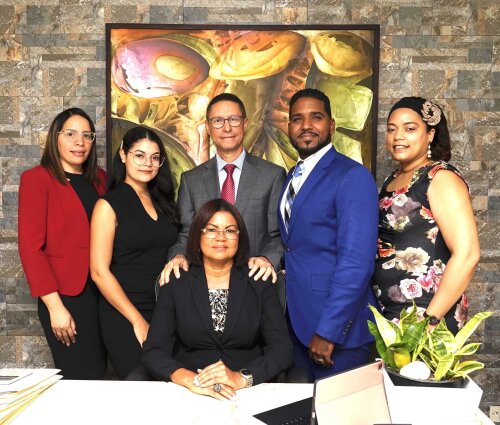Best Child Visitation Lawyers in Sosua, Cabarete
Share your needs with us, get contacted by law firms.
Free. Takes 2 min.
Free Guide to Hiring a Family Lawyer
List of the best lawyers in Sosua, Cabarete, Dominican Republic
About Child Visitation Law in Sosua, Cabarete, Dominican Republic
Child visitation, or “régimen de visita” as referred to in Dominican law, involves the legal rights and obligations for a parent or guardian to spend time with their child after a separation or divorce. In Sosua and Cabarete, as in the rest of the Dominican Republic, family courts prioritize the child's best interests while arranging visitation schedules. Whether parents are Dominican nationals or expatriates living in these communities, abiding by local legal processes and ensuring the child's welfare are of fundamental importance.
Why You May Need a Lawyer
Legal support is often essential in child visitation matters, especially in cases involving disputes between parents, concerns about the child's safety, or international relocation. Common situations when you may need a lawyer include:
- Disagreements between parents regarding the visitation schedule
- Difficulty enforcing existing visitation agreements
- Concerns about the child's safety with the non-custodial parent
- Relocation of one parent, including cases where one parent plans to leave the Dominican Republic with the child
- Allegations of parental neglect or abuse
- Involvement of authorities due to non-compliance with visitation terms
- Challenges when one parent is a foreign national and unfamiliar with local regulations
A qualified family lawyer can help navigate the court system, draft legal documents, represent your interests, and ensure the final visitation arrangement supports your child's wellbeing.
Local Laws Overview
Child visitation in Sosua and Cabarete is governed by the national Children and Adolescents Code (Código para el Sistema de Protección y los Derechos Fundamentales de Niños, Niñas y Adolescentes - Law 136-03). Key points include:
- The child's best interests are the primary consideration for any visitation agreement
- Visitation rights apply to both parents and, under special circumstances, can extend to relatives like grandparents
- Court intervention is necessary if the parents cannot agree on terms
- Decisions can be modified if circumstances change, for example if the child’s needs or parent’s situation changes significantly
- If one parent denies agreed access without valid reasons, the other may seek court enforcement
- Courts may restrict or supervise visitation if there are risks to the minor’s safety or emotional wellbeing
- International families must consider both Dominican law and potential international treaties (such as The Hague Convention) in cross-border cases
The judicial district responsible for these matters covers both Sosua and Cabarete, typically through the Family Court in Puerto Plata.
Frequently Asked Questions
What is the legal age for a child to decide on visitation in the Dominican Republic?
There is no strict legal age. However, courts may take into account the child's wishes, especially if the child is older and mature enough to express a preference.
How are child visitation schedules usually decided?
Schedules are set based on the child's age, routine, best interests, and the parents’ circumstances. Courts encourage agreed arrangements but can mandate schedules if parents disagree.
Can grandparents or other relatives request visitation rights?
Yes, grandparents and other close relatives can petition the court for visitation rights, particularly if the relationship is meaningful to the child.
What happens if my ex-partner fails to comply with the agreed visitation?
You may file a request with the family court for enforcement. The court may intervene and penalize repeat violations.
Is supervised visitation ever required?
Yes, if there are concerns about abuse, neglect, or harm, the court may order supervised visitation to ensure the child's safety.
What should I do if I plan to move abroad with my child?
Obtain consent from the other parent or a court order. International relocation without legal approval may violate custody and visitation rights and bring serious legal consequences.
Can child visitation arrangements be changed?
Yes. Either parent can request a modification if circumstances change, provided the change aligns with the child's best interests.
How does the court handle cases where one parent lives outside the Dominican Republic?
Courts consider distance, travel costs, and means of communication, often arranging extended visits during holidays or school breaks, as well as virtual contact.
Are visitation rights linked to child support payments?
No. Failure to pay child support does not automatically result in loss of visitation rights, and visitation cannot be refused for non-payment.
Is legal assistance required to resolve child visitation issues?
While not mandatory, legal guidance is highly recommended to ensure the process adheres to local laws and protects your rights and those of your child.
Additional Resources
For those needing further information or support, the following organizations can be helpful:
- Family Court of Puerto Plata (Juzgado de la Familia de Puerto Plata) - handles child visitation cases for Sosua and Cabarete
- National Council for Children and Adolescents (CONANI) - provides resources and child protection advocacy
- Legal assistance centers (Consultorios Jurídicos Gratuitos) in Puerto Plata
- Local attorney associations with family law specialists familiar with expat and international cases
- Embassy or consulate services for foreign nationals dealing with cross-border family issues
Next Steps
If you are facing child visitation issues in Sosua or Cabarete, start by gathering all relevant documentation, such as birth certificates, existing court orders, and any communication regarding visitation. Consider consulting with a local family lawyer who speaks your language and understands both Dominican and international family law considerations. Arrange an initial consultation to discuss your case and options. If your matter is urgent or involves the child’s safety, contact local authorities or family court immediately. Staying informed and seeking professional legal advice ensures the best outcome for you and your child.
Lawzana helps you find the best lawyers and law firms in Sosua, Cabarete through a curated and pre-screened list of qualified legal professionals. Our platform offers rankings and detailed profiles of attorneys and law firms, allowing you to compare based on practice areas, including Child Visitation, experience, and client feedback.
Each profile includes a description of the firm's areas of practice, client reviews, team members and partners, year of establishment, spoken languages, office locations, contact information, social media presence, and any published articles or resources. Most firms on our platform speak English and are experienced in both local and international legal matters.
Get a quote from top-rated law firms in Sosua, Cabarete, Dominican Republic — quickly, securely, and without unnecessary hassle.
Disclaimer:
The information provided on this page is for general informational purposes only and does not constitute legal advice. While we strive to ensure the accuracy and relevance of the content, legal information may change over time, and interpretations of the law can vary. You should always consult with a qualified legal professional for advice specific to your situation.
We disclaim all liability for actions taken or not taken based on the content of this page. If you believe any information is incorrect or outdated, please contact us, and we will review and update it where appropriate.










